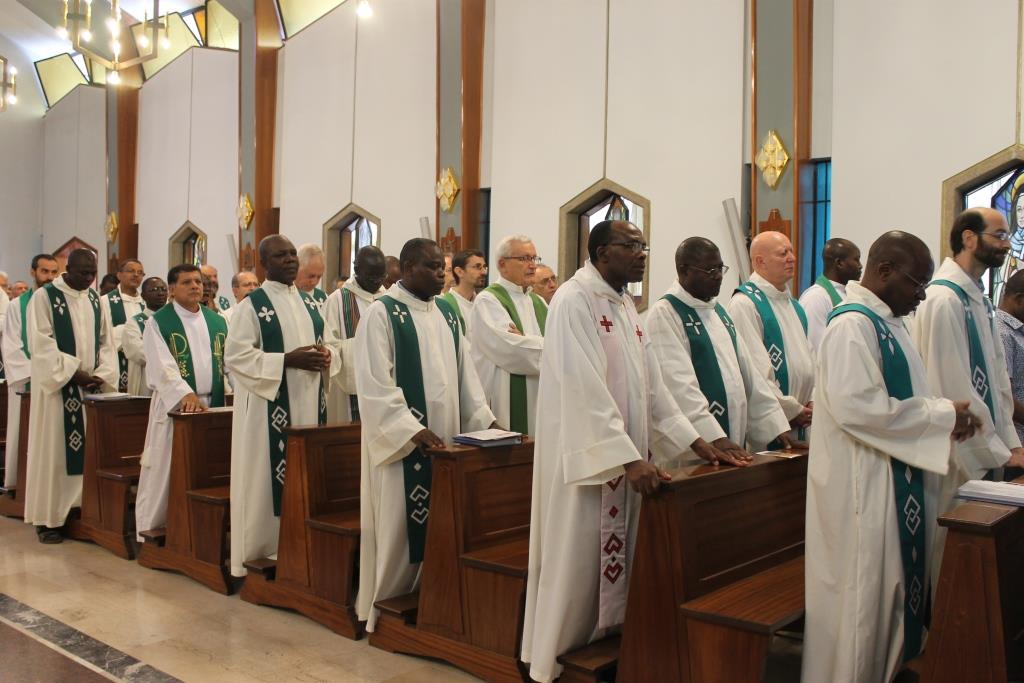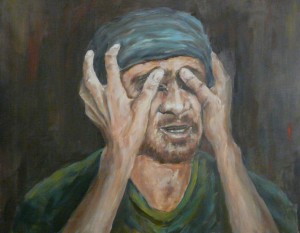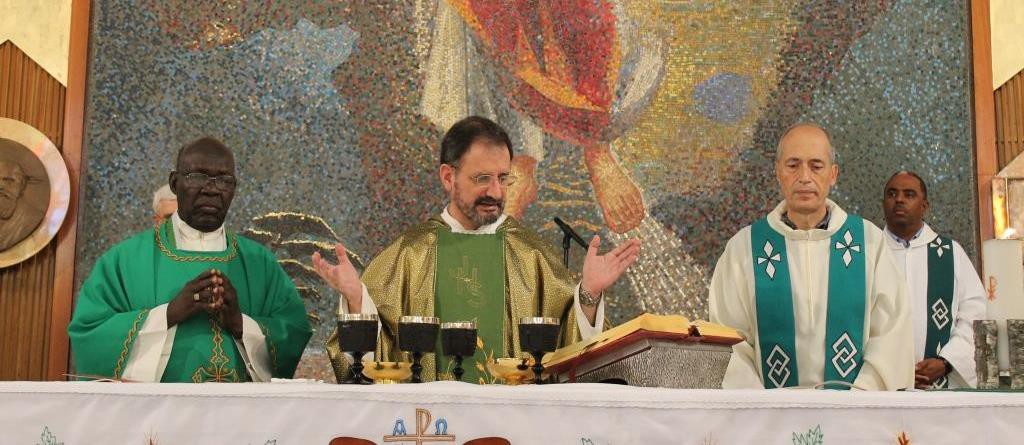 This last Sunday has officially started the XVIII General Chapter of the Comboni Missionaries with the Holy Opening Mass.
This last Sunday has officially started the XVIII General Chapter of the Comboni Missionaries with the Holy Opening Mass.
The chapter members had a previous week of preparation.
The chapter will end next October 4th. During this time, we will remain in prayer for the good progress of it, for the good of the Comboni Family and the mission to which we are called.
For a constant information you can visit the official website of male religious institute www.comboni.org where besides daily news, you may find a series of videos called “Voci the capitolo” where the chapter members provide some important aspects they are treating and the progress of the sessions and meetings.
United in prayer.
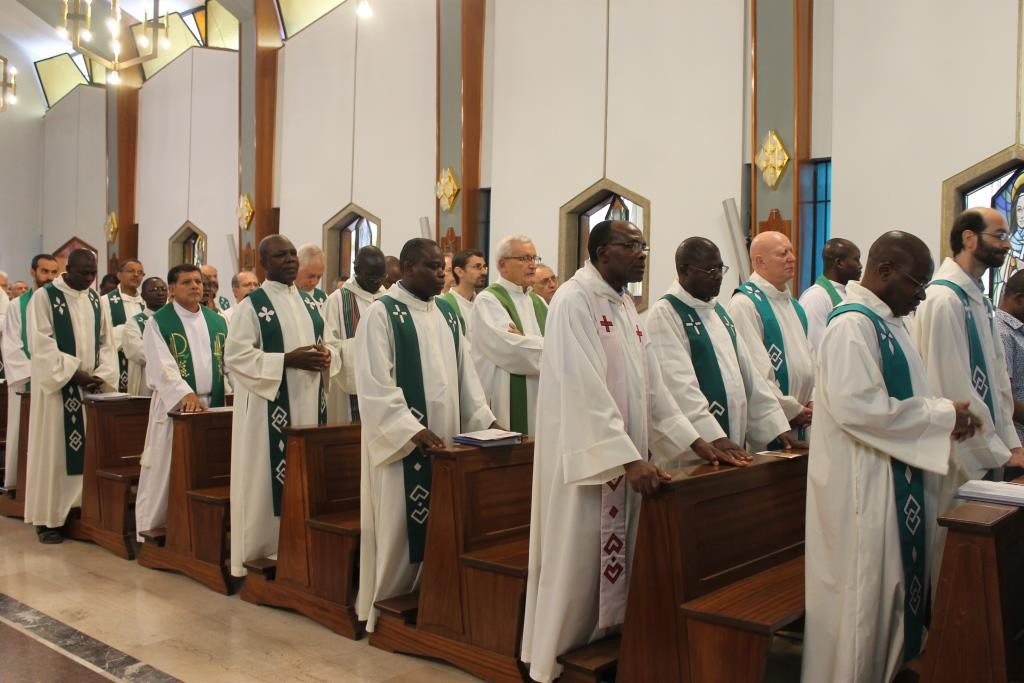
English
Youth Gymkhana
Last Sunday the gymkhana was performed with the theme: “we are called to live young.” It was organized by the coordinators of youth of the parish of Santo Domingo and aimed to promote integration, encouraging youth engagement in the way of faith and building the Kingdom of God through the civilization of Love.
During the meeting and as a proposal for the month of vocations, some stalls were organized by the Comboni Missionaries, Salesian Sisters, Brothers of Saint Gabriel and Lay Comboni Missionaries.
The organization of the gymkhana began with the Mass in the community of San Judas, the offertory of the Mass has been donated to the settlement Rosa Leon as a concrete gesture of action: “I come to do, with pleasure, your will Lord.”
Free to listen and to speak
A commentary on Mk 7, 31-37 (XXIII Sunday O.T., September 6th 2015)
Mark, in today’s reading, portrays Jesus in “pagan” country, where people were not following Jew religion. But, beyond the religious differences between those people and the people of Nazareth or Jerusalem, there it was a concrete, real man with a concrete, human problem, that is the same for believers and unbelievers, rich and poor, educated and illiterates. That man was deaf and could not speak properly, something that affected his human condition at a very fundamental level.
Moreover, it seems clear that what Mark intends with the narration of this experience is to explain to us what the real mission of Jesus is:
Jesus’ mission consists in using the power-love of God (symbolized by the continuous touching with fingers and hands) to liberate humanity, not so much from our physical deafness, but, more important, from our deep inability to understand God and our neigbours, closed up in our own sterile pride. From that deafness comes up also our inability to say meaningful words to others.
When I was a young priest, I have known a ten years old boy, whom everybody thougth he was both deaf and mute, till young nun started to give attention to him, accompanying him with a great, continuous and constant love. After some time, she discovered that the child had a physical problem with his ear and took him to the doctors. Solved that problem, the child began to hear the words spoken to him and to repeat them, learning how to listen and how to speak. I was then very much impressed by the power of love, able to start off processes of liberation and healing.
Certainly, not always happens that way, rather in most cases deaf people have to learn how to do without spoken words. But, again, as in the Gospel, the reference is not so much the physical deafness, but that close heart that leads us to close the channels of communication and loving relationship with the members of our family or our community, with people of other cultures, political ideas or religious practices…
Quite often we become “deaf” and “mute” in the deepest side of our personality: we refuse to listen to what other people have to tell us… and for that same reason we are not able to say any “relevant” word to tem or to others: we do not have a sincere, meaningful, liberating word to say, because we do not listen.
We remember the story of Emmaus: Jesus approaches the disciples, walks with them and listen to them. Afterwards he would say clarifying and meaningful words.
Sometimes, it seems that our Christian communities have become deaf and mute: They do not listen to the cries of our humanity (Migrants, refugees, young people, women…, nor to the prophets or our time, those people who can help us to understand God’s ways for today. And because of this deafness they become also “mute”, unable to announce any meaningful message to today’s humanity.
A missionary Church is a church that listens, free from the deafness of his pride and arrogance. Only after that liberation, can it become truly missionary, messenger of the good news of God’s love for people.
In the Eucharistic celebration, Jesus “touches” our body. Let us pray that He heals our deafness and liberates our tongues so that we can become true missionaries, healed and instruments of healing, while we continue walking in life towards a fuller communion with God and our fellow men and women.
Fr. Antonio Villarino
Roma
The heart is what matters
A commentary on Mk 7,1-8.14-15.21-23 (XXII Sunday O. T. August 30th 2015)
 After five Sundays reading John’s chapter sixth (Jesus, the Bread of Life), we come back to the ongoing reading of Mark; five Sundays ago we left Jesus in Galilee, praying over the mountain, walking over the lake, healing sick people… announcing the Kingdom of God, the kingdom of God’s nearness, mercy and truth.
After five Sundays reading John’s chapter sixth (Jesus, the Bread of Life), we come back to the ongoing reading of Mark; five Sundays ago we left Jesus in Galilee, praying over the mountain, walking over the lake, healing sick people… announcing the Kingdom of God, the kingdom of God’s nearness, mercy and truth.
In today’s reading we see Jesus in a clear confrontation with a group of people coming from Jerusalem –Pharisees and scribes- that confused human rules and traditions (even religious) with the true cult to God. It’s not a new theme, since the prophets used to recall it from time to time. In fact, Jesus quotes Isaiah, whose words cut through hypocrisy as sword with a cutting edge:
“This people honours me with the lips,
But their hearts are far from me.
In vain do they worship me
Teaching as doctrines human precepts” (Is 29, 13)
And Jesus insists:
“Nothing that enters one from the outside
Can defile those persons,
but what come from the heart”.
It’s not that Jesus despises human rules and laws (even religious ones); the may be very useful and needy for social living. Jesus, in general, was quite respectful and obedient to these laws and to the rules of his human and religious community. But what he says is that we should not confuse these human laws and traditions with the “true cult to God”, especially when behind them there’s a wicked, arrogant and insincere heart.
The cult to God is truthful when proceeds from a heart that is right, truthful and merciful. The tree does not giver better fruits just because somebody paints nicely the leaves, but when its roots are “rooted” in a good and fertile land. In the same way, people are not changed with external rites but with the Word of God accepted and received in a heart that is open, sincere, and rightful. That’s what the heart of Jesus is, the same we identify ourselves with when we go to communion. From this heart many good fruits come out: good works, new rules, new traditions, and new forms of cult… Where there’s life, life is generated.
Give me, o Lord, a heart that is rightful, sincere, and open to the Holy Spirit, who makes everything new.
Fr. Antonio Villarino
Roma
The big crisis: The scandal of human fragility
A commentary on John 6, 60-69; XXI Sunday of O.T., August 23th, 2015
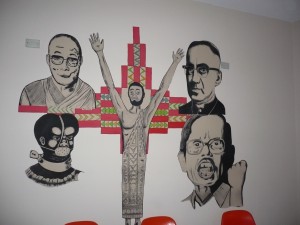 We read today the last part of John’s chapter sixth, the same we have reading for five Sundays. The chapter somehow has a dramatic ending, with a big crisis, that leads the disciples to abandon Jesus. That is why I think it very important for us to meditate on this reading, since most of us pass, in a way or another, through similar crisis. On my side I offer two reflections:
We read today the last part of John’s chapter sixth, the same we have reading for five Sundays. The chapter somehow has a dramatic ending, with a big crisis, that leads the disciples to abandon Jesus. That is why I think it very important for us to meditate on this reading, since most of us pass, in a way or another, through similar crisis. On my side I offer two reflections:
1.- Where does the scandal stay?
The disciples accuse Jesus of say “hard words”. For long time, this “hardness” was explained as the difficulty to accept Jesus’ words understood in a literal sense of “eating his flesh and drinking his blood”. But we know, by now, that Jesus speaks in the context of Hebrew culture and biblical language. In this context, it’s clear that to “eat his flesh” means to believe in the divine presence in his humanity and to “drink his blood” means to accept his life given up on the Cross, out of obedience and love.
But it’s precisely here where we find the scandal that became the big crisis. Many could not accept the image of God as it was revealed in Jesus. For them God is powerful, owner of everything, always triumphant, somebody to be afraid of… And that should be the same with His Messiah. But Jesus presented Himself as the human incarnation of a different image of God: Someone that welcomes sinners gives priority to the healing of a sick man rather than to the sacredness of the Sabbath, someone that appears as fragile and looser on the Cross, someone that shares the experience of death…
Many good people found this totally unacceptable. They were happy with Jesus as a marvellous teacher, they agreed with his plan to renew religion, they were moved by his power over sickness and bad spirts… But now Jesus was going too far. He was proposing a deep change in their image of God. Now He was proposing to leave aside all hypocrisy and falsehood, to accept that they themselves were sinners and fragile, and to allow God to become their companion, someone that wanted to share their fragility and from that deep solidarity to heal the root of their stupid pride. That was the real scandal.
2.- What about us? Where does our scandal stay?
We all pass for experiences that scandalize us. I think that what really scandalizes us it’s not something theoretical or an intellectual “mystery” that we do not understand in our mind. Certainly, there are aspects of the revealed truth that sometimes we do not understand and that we should try to understand better through studying and spiritual deepening. But, on my opinion, the real scandal that prevents us from believing and accepting Jesus totally is our own fragility (personal and social); what scandalizes us it’s the reality of sin (in the Church and outside it); we are scandalized by our own sins and failures, by the failures of the Church, by the failures of society. We are scandalized by a God that does not act as magician to resolve our many problems; we are scandalized by this Jesus, poor and humble, who fails on the cross and at the same time trust in the Father, in solidarity with so many poor, sick and sinners.
But, against our scandal, this is the biggest gift that, according to John, makes the disciples who believe become children of God. This faith liberates me, so that I do not have to “demonstrate” nothing to anybody, I do not have to lie to myself and to others as if I never made a mistake. People obsessed to be always wright end up by being hypocrites and to live in falsehood. On the contrary, Jesus accepts the human fragility, the failure and even the death. And, in doing so, He acts as what He really is: the SON, unconditionally loved and able to love unconditionally.
To believe this is to enter into communion with Jesus, to “eat his flesh” and with him find the way to the fullness of the Father’s love and live. Do not believe it’ s not to “eat”, not to enter in communion with him and to remain in the lie and falsehood of the one that tried to deceive Adam as if He were a God by himself and not in obedience to the Father.
All of us, in a moment of our life, have to go through this crisis: Do I pretend to be like Adam, a false “god”? Do I pretend to be like the prodigal son thinking that I am going to be more autonomous and happier away from the Father? Or do I accept myself, in my fragility, and accept the solidarity of Jesus, who descends with me into the river Jordan of this my fragility and with me rises to the communion with the Father?
To go to take communion regularly means to say yes to the last question and to renew our trust in Jesus and his Father, in spite and through the continuous experience of the many sins and fragilities in ourselves and in others.
P. Antonio Villarino
Rome




